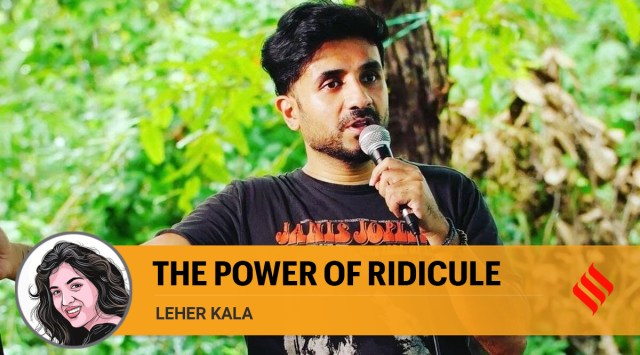
Stand-up comic Vir Das elicited a wholly predictable response to his impassioned lament on the dichotomy of surviving two, contradictory Indias. In the much-applauded monologue held at Washington’s prestigious Kennedy Centre, Das highlighted the shocking contrasts we internalise, like how the world’s largest population under 30 endures “75-year-old leaders with 150-year-old ideas”. Madhya Pradesh’s Home Minister declared Das persona non grata in his state while another BJP leader filed a complaint against him for “vilifying” India on foreign soil. Comedy in India has become a dangerous business: in January, comedian Munawar Faruqui was arrested for allegedly passing indecent remarks about Hindu deities. In 2019, comic artist Agrima Joshua received rape threats for a joke on a statue of Chhatrapati Shivaji.
It’s not difficult to see why touchy politicians feel threatened by comedians. They instinctively understand humour packs in so much more than just frivolous entertainment; it provides clarity on bizarre situations that are otherwise impossible to comprehend. Some years back, a friend’s father expired on a cruise liner in the Caribbean. There’s nothing funny about this — until you hear that the friends he was travelling with continued with their vacation despite this catastrophe. Undoubtedly, it cast a dampener on everyone’s spirits, but logic had reared its sensible head. They had paid a full advance and had flights booked only at the end of the cruise. Meanwhile, my friend doesn’t tire of relating this morbid story, how he reached shattered three days later, to a teary mother and his father in a morgue. A way, perhaps, to process the painful realisation: what makes every trauma bearable yet unbearable is that life goes on.
Throughout history, disaster has inspired dark satire. The genre of ‘tragicomedy’ emerged around the 3rd century BC and gained in popularity as theatre evolved to include nuance. It is thriving in a new millennium because we are all familiar with the dysfunctions of adulthood. Existence isn’t purely tragic or comic but a frustrating combination of the two. In fact, if one must find fault with Das’s diatribe, it’s that it wasn’t (bitterly) hilarious enough. The best jesters point out deficiencies in human nature and society by slyly revealing them to be absurd. Basically, turning the grim into grimly amusing. Ridiculousness is implied, never overtly stated. However, when a joke speaks truth to power, it can turn into a lethal tool for disruption. Bill Cosby’s life blew up because of one sneer by a comedian: “You rape women, Bill Cosby, so turn the crazy down.” Just like that, the floodgates to uncontainable fury burst open.
Indians are not known for their ability to laugh at themselves. In our defence, life here has always been a struggle to keep suffering at bay while building endurance. You need to be able to take basics for granted to engage in light-hearted merriment. But circumstances have us tightly wound up, unable to relax. Alas, even a who-cares attitude is a privilege of richer nations. Our countrymen are religious but not spiritual, which means a lot of mind space is wasted worrying about nonsense, like kids’ marriages and relatives’ opinions. So, when comedians use our depressing realities as material, not everyone sees that truth is way funnier than fiction. Many people feel genuinely aggrieved that Das was denigrating India abroad, not realising that articulating the unsaid stirs dialogue. It makes room for the perspective that, even with all our differences, we are essentially the same.
To brand comedians as dissenters for critiquing historical wrongs through parody is, ironically, a perfect example of the genre of absurdist comedy — that taps into the paradoxes and irrationalities of the modern world. It takes courage to make peace with our chaotic country and, occasionally, we are entitled to laugh at it. In any case, who are we kidding? The joke’s on us.
The writer is director, Hutkay Films